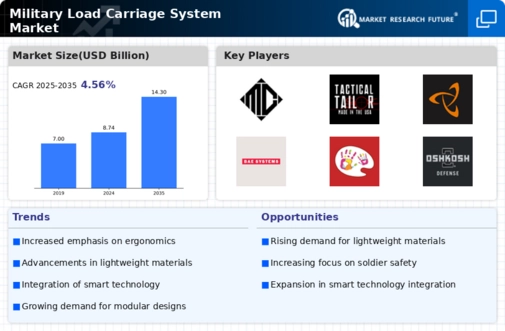Top Industry Leaders in the Military Load Carriage System Market

The military load carriage system market is a dynamic and competitive landscape driven by the increasing demand for advanced, lightweight, and ergonomic solutions for soldiers' equipment. Key players in this market are continually striving to gain a competitive edge through innovative product offerings, strategic partnerships, and technological advancements.
Key Players:
- Aegis engineering is limited in the U.K.
- BAE systems inc. in the U.K
- Boston dynamics in the US
- CQC in the U.K.
- Lockheed Martin in the U.S.
- Australian defense apparel in Australia
- Honeywell international inc. in the US
- ADS, inc. in the USA
- Sarkar defense solutions in the U.K.
Strategies Adopted:
To maintain their competitive positions, key players are adopting various strategies. One prevalent approach is investing in research and development to create state-of-the-art load carriage systems that address the evolving needs of modern warfare. Additionally, strategic collaborations with technology partners and military organizations are common, facilitating the integration of advanced materials and technologies into their products.
Factors for Market Share Analysis:
Market share analysis in this industry involves a comprehensive evaluation of factors such as product innovation, durability, customization capabilities, and overall performance. Key players differentiate themselves by offering solutions that enhance soldier mobility, comfort, and operational effectiveness. The ability to provide scalable and modular systems also plays a crucial role in determining market share, allowing military forces to adapt the load carriage systems to specific mission requirements.
New and Emerging Companies:
While established players dominate the market, there is a growing presence of new and emerging companies entering the military load carriage system sector. These companies often bring fresh perspectives and agile development processes. Start-ups focusing on smart textiles, wearable technologies, and advanced materials are becoming noteworthy contributors to the market, challenging traditional players with innovative solutions.
Industry News:
The military load carriage system market is dynamic, with frequent developments and advancements making headlines. News regarding successful product trials, contract awards, and collaborations are common. For instance, announcements related to the integration of Artificial Intelligence (AI) and sensor technologies into load carriage systems for real-time health monitoring and data analysis have garnered significant attention. Industry news serves as a barometer for market trends and the competitive landscape, influencing stakeholders' decisions.
Current Company Investment Trends:
Investments in technology, especially in areas like smart textiles, energy harvesting, and lightweight materials, are prevalent among key players. Companies are allocating significant resources to enhance the performance and capabilities of their load carriage systems. Moreover, strategic investments in mergers and acquisitions are observed, enabling companies to expand their product portfolios and market reach. Investment trends also reflect a focus on sustainability, with companies exploring eco-friendly materials and manufacturing processes.
Overall Competitive Scenario:
The overall competitive scenario in the military load carriage system market is marked by intense rivalry and a constant pursuit of innovation. Key players are engaged in a race to offer solutions that not only meet but exceed the expectations of military forces worldwide. Customization, adaptability, and integration of advanced technologies are critical elements shaping the competitive landscape. The market is not only driven by the traditional defense industry players but is also attracting attention from tech companies specializing in wearables, IoT, and AI.
Recent Developments:
BAE Systems:
Signed a contract with the U.S. Army for $36 million to deliver the Improved Outer Tactical Vest (IOTV) Gen 4. The IOTV Gen 4 is a modular and scalable system designed to improve soldier comfort and protection while reducing weight and bulk.
Announced the development of a new exoskeleton technology that could assist soldiers in carrying heavy loads and reducing fatigue. The technology is still in the early stages of development, but it has the potential to revolutionize military load carriage.
Lockheed Martin:
Won a $15 million contract from the U.S. Marine Corps to provide its Modular Lightweight Load-Carrying Equipment (MOLLE) system. The MOLLE system is a versatile and adaptable platform that allows Marines to customize their load carriage to meet their specific needs.
Partnering with a startup company to develop a new type of 3D-printed body armor that is lighter and more comfortable than traditional armor. The new armor is still under development, but it could offer significant advantages for soldiers in the future.











